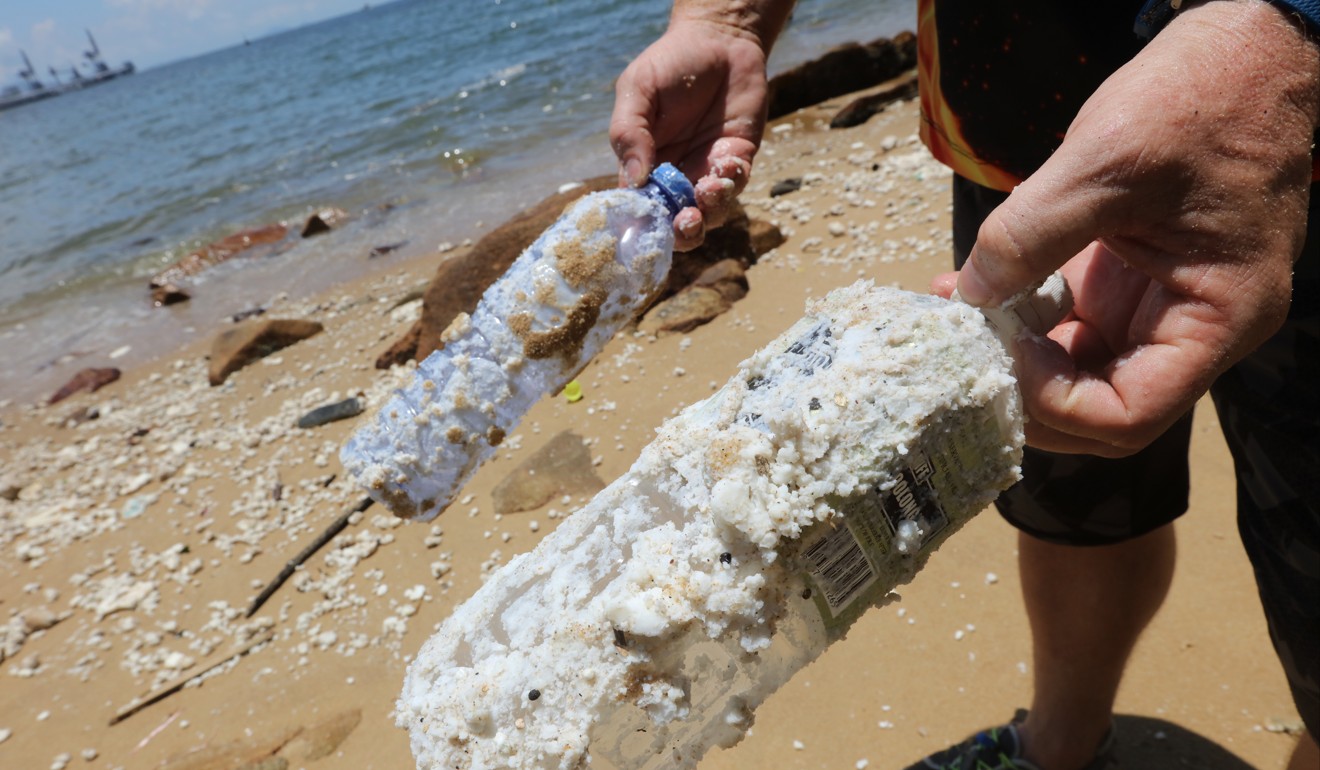
Japanese-owned tanker and Singapore container ship identified as vessels in collision leading to palm oil spill
Green group says public misled on location
A Japanese-owned chemical tanker registered in Panama and a Singaporean container ship have been identified as the two vessels involved in a collision in mainland Chinese waters that led to the recent palm oil spill that has inundated Hong Kong’s beaches with globs of stearin.
Singapore-based Pacific International Lines (PIL) confirmedto the Post on Monday that its ship, the Kota Ganteng, had collided with Global Marine Service’s (GMS) Global Apollon at about 5am on August 3, just a few kilometres southwest of Hong Kong as it was en route to the port of Nansha at the mouth of the Pearl River Estuary.
The Global Apollon, which was heading east at the time from Guangzhou’s Xinsha Port, was bound for Wenzhou and Shanghai and was carrying 9,000 tonnes of raw palm oil stearin.
Government’s optimism over palm oil spill ‘ludicrous’ say volunteers cleaning up Hong Kong's beaches
The Apollon’s registered owner is Alavanca Incorporated, a Panamanian affiliate of Japan’s Global Marine Service. Built in 2015, the 141-metre oil-chemical tanker has a gross tonnage of 10,754 and a cargo capacity of 18,754 litres.

“The bow of the Kota Ganteng made contact [with the] starboard side of the Global Apollon in way of her No 6 starboard tank, which contained about 1,000 tonnes of refined blended and deodorised palm stearin,” a PIL spokesman said. “As a result, both vessels sustained damage but there was no injury to any crew on board.”
Both vessels exchanged information and the Kota Ganteng headed to Nansha to discharge and load her cargo. After dealing with the Chinese maritime authorities, the Kota Ganteng was cleared to leave for Singapore on August 6, PIL said. The 226-metre Kota Ganteng has a gross tonnage of 28,676.
According to the ships’ automatic identification systems, the Global Apollon is now anchored off Guishan near Zhuhai.
Hong Kong government seeks legal advice for damage claims over palm oil spill
The Tokyo-based company did not respond to Post inquiries. Last week, a spokesman told shipping industry news service TradeWinds News that the Global Apollon was “under inspection”, but declined to comment further.
The Marine Department said it was “inconvenient” to comment on the matter as it was still consulting the Department of Justice on how to recover clean-up costs from the responsible owners.

Roy Tam Hoi-pong of the environmental activist group Green Sense criticised the government on Monday for misleading the public on where the collision took place – about 4km southwest of Hong Kong off Daizhi Zhou, and just 5.7km from the Soko Islands.
“At such a close distance, they are still telling the media and public that it took place in the ‘Pearl River Estuary’,” Tam said. “If mainland authorities really considered Hong Kong’s situation, they would have notified it earlier [than two days later], and the closure of more than a dozen beaches would have been avoided.”
Hong Kong government struggles to clean up mess as palm oil spill spreads
A government spokesman said Tam’s criticisms were incorrect, and that officials had already pointed out last week that the collision took place a “few nautical miles” southwest of Hong Kong.
A Regional Maritime Oil Spill Response Plan involving the city, Guangdong, Macau and Shenzhen obliges each party to report a spill if it is expected to affect neighbours so that plans can be drawn up. But no time frame is mentioned in the plan.
As of noon on Monday, government departments had collected 205 tonnes of palm stearin from the sea and beaches. Six of 13 closed beaches had reopened.

